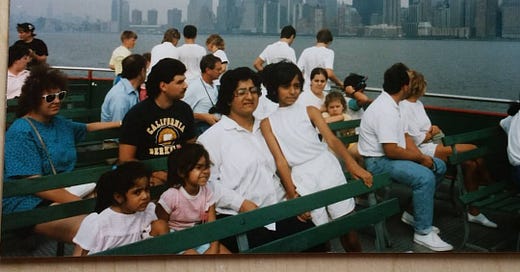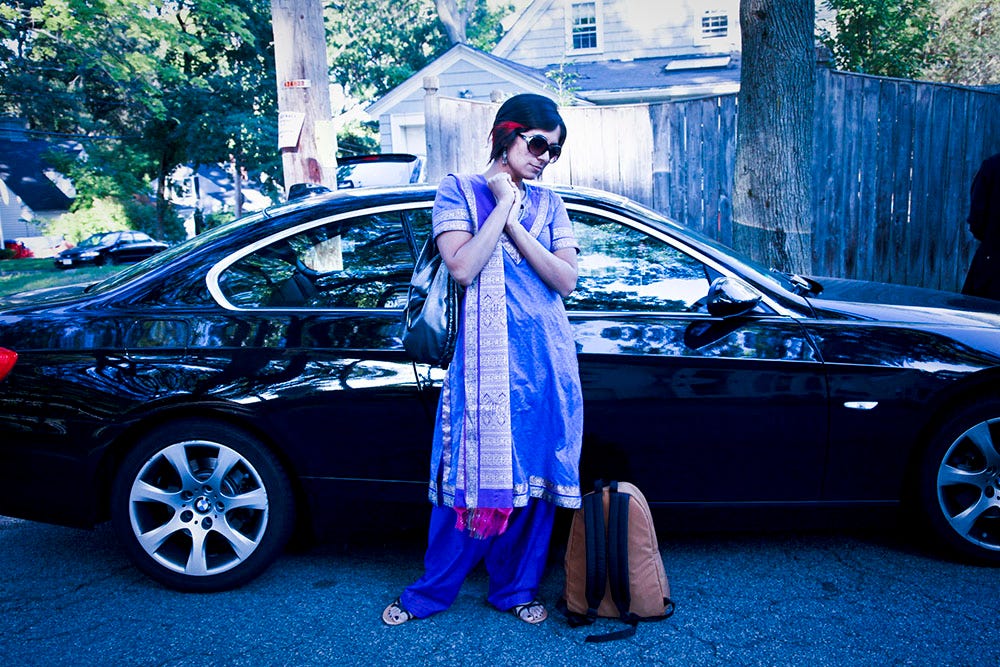Welcome to my substack #8. Soundtrack to this post: The Kominas & SwetShop Boys
1. I don't want to talk how I felt as a Muslim American on Sept 11th - I want to talk about how I organized a nation of South Asian youths to turnout to vote in the first election after Sept 11th, so that we could reclaim our power. It was awful AND we did something about it. I don't want to talk about how the world tried to victimize and scapegoat us in same hypocritical breath - I want to talk about how hard we had to WORK to remind ourselves of our resilience and why we deserved to live with joy and faith.
2. To talk about 9/11 means talking about how it was before 2001. When as a teen I mentioned how I wanted to get involved in South Asian activism, people would suggest various programs in India and Bangladesh. To be a college kid in the late 90s meant going to Indian parties – the type of parties where the Punjabi kids would get into fist fights in the parking lot and no one would fill out a voter registration form. To be a Muslim Student Association member in college meant to only focus on the spiritual, and not a bit on social justice (unless it was Palestine or Kashmir). There was no place for activism for a Brown Muslim kid as a Brown Muslim American. It wasn’t just that the mainstream was othering us, it’s that as Brown people, we were othering ourselves. We exoticized ourselves. We only valued ourselves through homeland politics and homeland narratives. There was no room to organize at the intersections of being Brown and domestic issues.
3. I found my activism through environmentalism and electoral politics. I tried, I really tried, to find a way to intersect social justice with Muslim and South Asian communities. But it was an impossible task. Until September 11th happened. Because then, it was so clear how South Asians and Muslims lacked the political community power cultural capital in America to truly react powerfully to what was happening around us. And only then, South Asian and Muslims organizers and activists that were gaining skills in other movement spaces decided we needed to make South Asian American activism happen.
4. Only then can we talk about 9/11. We didn’t just organize a community – but we built the foundation of the structure as we were flying the plane.
5. As Muslim Americans we are asked to reflect on this day every year and every year they want us to replay the trauma of what our community felt in that moment on that day. We are asked our opinion on foreign policy. We are asked to verify our belief in our faith, and reconfirm our place on the racialized hierarchy. We are asked if we are the good kind or the bad kind. This week I’m reflecting on how culture shifted and how we made the culture shift.
6. The thing they don’t tell you about ageing is that you can look back on the past twenty years and literally track the culture shifts. I’m not talking about storytelling, making art, punk shows, walking tours, movies, books, dance parties, mixtapes, blogs and podcasts – I’m talking about all of those together. We made our own culture and we did it for the culture. We made people think differently and shift the whole of society – what a magnanimous task. We weren’t doing it for the activist points – we were reclaiming our humanity and our ability to live on our own terms. We had to remind each other we were humans to each other and that our lives existed in a way that deserved to be lived.
7. The story I usually tell about 2001 is now irrelevant. The audience is too young to feel the impact of my origin story.
8. I am reminded of the feeling of defiance. The gritted teeth chin pointed skyward. Feeling the snipers on the DC rooftops looking at you through a scope as you walked on sidewalks. Wearing a fuck Bush t-shirt through TSA. Walking on the streets in protest and marches and in spite. Handing out Know Your Rights flyers at markets and stores. Acting like a punk and feeling like a rebel. Fierce solidarity. Disruption was a tactic. We had so much rage.
9. We inserted ourselves in spaces that made people uncomfortable. We were already uncomfortable. We would make our existence uncomfortable others.
10. The first national voter engagement project for South Asian youth after 9/11. The only outspoken Muslim on the largest South Asian American blog. A Master in Public Policy with a focus on Critical Race Theory so that I could learn how to do BIPOC data. A student led course on CRT in School of Public Affairs because they didn’t have a professor that could teach it. Founding organizer of an annual radical Desi youth camp. The first Muslim American women podcast, 5 years running. Turning out over 500,000 voters in 17 different AAPI languages. A widely popular column with multiple viral essays. Part of Muslim zine collective. Multiple poetry open mic spots. Multiple groundbreaking anthologies. Performed poetry at the White House when I received an award. A protest sign in the archives at the Smithsonian Museum of American History.
11. I hate framing things as firsts (because no one ever is when you dig into history) but it’s hard being in the firsts. I didn’t have the language of racial justice until my late 20s – now kids learn about intersectionality on tik tok. We created Bay Area Solidarity Summer simply because we wanted to create the activism training camp that we wish we had access to as a kid. That’s ten years of kids now adults in the world that leap frogged into activism access I didn’t know I could dream of. Yeah, I’m jealous, but mostly I’m just a little sad that our culture shift work was not seen as significant because time has made culture shift seem so easy.
12. But I remember. And I keep archives and save photos and remind myself that we are making our own history.
13. Our activism wasn’t a game. It was a reminder – we are the center of our stories and only we will give ourselves the space to re-center our stories. We deserve to live even when a whole society has dehumanized us to make it easier to see people like us without life. Our existence is valid even when the propaganda tell us we don’t. We are neither bad nor good, we are both bad and good. We do not fit into your boxes - we are breaking boxes. We are not confused and hyphenated. We are whole, and in our own entirety. This is a journey, and we are laying out a trail of spray canned alponas on our path.
14. Never forget.
15. The goal post is constantly moving but so are we.





